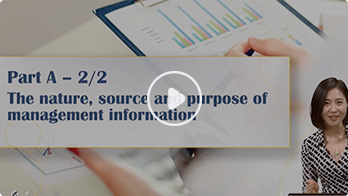【ACCA选择题】
3(a)Shaun likes to understand basic principles and take a hands-off approach based on logical argument.He wants to participate in a structured training programme which is run by teachers.
Louise needs to work at her own pace and tends to be fairly slow and cautious in her learning.She likes to observe things,take time to think about them and then produces a carefully thought-out conclusion.
Susan only likes to study if she can see a link to a real practical problem.She likes to learn new techniques through on-the-job training,but tends to discard good ideas which require some development to work properly.
Tony is flexible and optimistic,but does not have any patience with theories.He wants to receive hands-on training and enjoys practical problems.
Honey and Mumford classified the four following learning styles:
A Theorists
B Reflectors
C Activists
D Pragmatists
For each of the following individuals,select the correct learning style from the list above:
(i)Shaun
(ii)Louise
(iii)Susan
(iv)Tony(2 marks)
(b)Which two of the following are off-the-job training methods?
A Job rotation
B Computer-based training
C Temporary promotion
D Demonstration
E College courses
4(a)George,Helen,Josh and Leigh are all on development programmes.
George is learning skills that are not directly required in his current role,but should allow him to contribute more flexibly and innovatively to the organisation in the future whichever role he is in.
Helen is gaining experience of each of the different functions in her company as well as a variety of position and work settings as preparation for increased responsibility in the future.
Josh is receiving training to ensure his professional standards in his accountancy work are maintained and enhanced through education,development and training.
Leigh is partway through a series of planned secondments within her department and has recently been working in two project group for implementing new systems.
The following are all different approaches to development:
A Management development
B Personal development
C Professional development
D Career development
For each of the following individuals,select the development approach they are on:
(i)George
(ii)Helen
(iii)Josh
(iv)Leigh(2 marks)
(b)Which TWO of the following are necessary for a training programme to be effective?
A Training should be expensive
B There should be clear objectives
C Training should be off-the-job
D There should be timely feedback
E Training should be on-the-job

3(a)(i)A
(ii)B
(iii)D
(iv)C
These all relate to the classifications of Honey and Mumford.
(b)B,E The other options are all on the job training methods.
4(a)(i)D Personal development can help to foster employee job satisfaction,commitment
and loyalty.
(ii)A This may include the development of management/leadership skills or management
education such as an MBA.
(iii)C This is an example of continuing professional development(CPD).CPD is based on
the belief that a professional qualification is the basis for a career lifetime of
development.
(iv)B The trend for delayered organisations reduces opportunities for promotion,so
opportunities are planned for sideways or lateral transfers.
(b)B,D For training to be effective there should be timely feedback and also clear objectives for
the training.Training does not need to be on or off the job to be effective,it can be either.
Training does not need to be expensive to be useful.




 每日一练
每日一练
 发布时间:2019-05-20
发布时间:2019-05-20 


 复制本文链接
复制本文链接 模拟题库
模拟题库

 123
123














